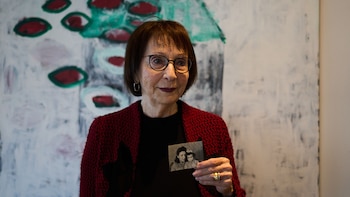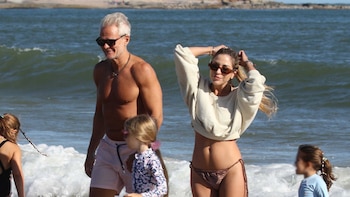
(ATR) It was a moment when all Australians and billions around the world focused on Sydney for the 2000 Olympic Games – a city girt by sea, showcasing a plethora of nature’s gifts of beauty rich and rare.
Sydney didn’t let Australia down with Olympic boss Juan Antonio Samaranch declaring the Games of the 27th Olympiad "the best Olympic Games ever."
And today 20 years on, Sydney celebrated what was a defining moment in the celebrated Olympic history in Australia’s picturesque harbor city – the second time Australia had hosted the Games after Melbourne in 1956.
Remembering the moment champion runner, indigenous hero Catherine Freeman survived a now famous malfunction in the cauldron mechanism before that magical moment when the flame eventually reached the top of cauldron to signal the start the Games.
Today was a COVID protected celebration where the focus was again on Sydney Olympic Park where the cauldron, now positioned in Cathy Freeman Park in the shadows of the main stadium, was re-lit.
With Freeman unable to attend the ceremony in person because of the Stage 4 lockdown in her home town Melbourne, Olympic and Paralympic wheelchair track athlete, golden girl Louise Sauvage, who lit the cauldron for the Paralympic Games and triple gold medalist from Sydney, swimming legend Ian Thorpe, were joined by two teenagers in a special re-enactment.
Sixteen-year-old basketballer Tenayah Logan, a member of the National Centre of Indigenous Excellence (NCIE) program and Tamsin Colley, a Rio 2016 Paralympian at just 14, in athletics, were front and centre.
But Freeman recalled the moment when Australian Olympic Committee boss John Coates asked her to light the cauldron.
"When ‘Coatsey’ asked me to do the honors, I was really taken aback," recalled Freeman.
"There were a few other people who I thought were so deserving of the honor. At the time, I was also being more concerned with my body’s health and making sure I was getting enough rest.
"It wasn’t until I got to Sydney in those days before Opening Ceremony that I started to think OK I have to be in this moment.
"When I reflect back on lighting the cauldron 20 years ago, the words that come to my mind are "surreal" and just simply magnificent.
"I am very proud of the fact that when I lit the cauldron all those years ago it was a symbol of hope for all young Australians.
"It is at times like this that I simply reflect and I wonder at the power of sport and the difference that sport can make in our lives."
But why did Coates choose Freeman for that special honor?
"Cathy was a world champion, an Olympic silver medalist and she was aboriginal and I thought it was very, very important to make a statement both to Australia and the world about inclusion and reconciliation and when she said ‘why me?’ I explained just that," Coates told Channel 7 Sunrise.
"I had seen through my own children that she was recognized by them as a great athlete and it did not matter to them whether she was black or white and I hoped that would become better understood amongst our population."
And his major highlights?
"The Opening Ceremony with Cathy lighting the cauldron and then her famous victory in the 400 metres remains the most significant memory for me," said Coates.
" And then the first night…Ian Thorpe’s 400m win (in the pool) to get us away…the individual gold medals to Simon Fairweather (archery) and Lauren Burns (Taekwondo) and the three girls teams were particularly important – to us and (for) morale.
"The women’s water polo final when we beat the USA with Yvette Higgins goal in the last second; our Hockeyroos defended their Atlanta gold medal going through undefeated and winning 3-1 against Argentina in the final and the one we didn’t win..the girls basketball was just something else.
"We had made the final against the US..Laurie Lawrence (former swim coach and chief cheer leader) got the team together and we just walked through the doors, we didn’t have tickets and we sat down there amongst all the athletes and the banter between our athletes and the US athletes was just amazing.
"Team sports are part of our philosophy in Australia and they really played a big role….and did us proud."
And why were these Games so successful?
"The planning was very good; we planned for the athletes the (Australian) team did brilliantly; the medalists and the whole team; we had 624 athletes in the team," recalled Coates.
"Sydney embraced the Games; they welcomed the visitors and the volunteers were just magical; the world had never seen volunteers like this before..but we have had them here (patrolling) our beaches and fighting the bushfires.
"But they were what really distinguished these Games..and you put it all together and that’s what made it so successful…"
Thorpe stood tall today, just as he had done 20 years ago with the hopes of a nation resting on his 17-year-old shoulders, and with his mum Margaret, father Ken and swimming sister Christina screaming in the grandstand, the kid from Padstow in Sydney’s working class west, delivered in spades.
His most successful moments of a distinguished career – three gold in the 400m freestyle and 4x100m freestyle relay and the 4x200m freestyle (all in world record times) and individual silver to flying Dutchman Pieter van den Hoogenband in the 200m.
Thorpe was amongst the superstars of Sydney – the year the world came to his backyard and he was again front and center today.
"For me, I was never going to be able to walk in the Opening Ceremony and be in my best shape to be able to compete, so to be able to carry the flag in the Closing Ceremony most definitely made up for it, especially knowing how the country had received the Olympic Games and to see how much support there was," said Thorpe.
"Australia and Sydney really did an incredible job of not only showing what sport can be for Australians, but what it can be for the rest of the world and the rest of the world still looks at us when it comes to the Olympics because of how successful the Sydney Olympics were."
And as one of the country’s great story tellers, Olympic historian, the late Harry Gordon wrote in his post Sydney 2000 Games book "It was the time of our lives……!"
Written and reported by Ian Hanson in Sydney
For general comments or questions,click here.
Your best source of news about the Olympics is AroundTheRings.com, for subscribers only.
Últimas Noticias
Sinner-Alcaraz, the duel that came to succeed the three phenomenons
Beyond the final result, Roland Garros left the feeling that the Italian and the Spaniard will shape the great duel that came to help us through the duel for the end of the Federer-Nadal-Djokovic era.
Table tennis: Brazil’s Bruna Costa Alexandre will be Olympic and Paralympic in Paris 2024
She is the third in her sport and the seventh athlete to achieve it in the same edition; in Santiago 2023 she was the first athlete with disabilities to compete at the Pan American level and won a medal.

Rugby 7s: the best player of 2023 would only play the medal match in Paris
Argentinian Rodrigo Isgró received a five-game suspension for an indiscipline in the circuit’s decisive clash that would exclude him until the final or the bronze match; the Federation will seek to make the appeal successful.

Rhonex Kipruto, owner of the world record for the 10000 meters on the road, was suspended for six years
The Kenyan received the maximum sanction for irregularities in his biological passport and the Court considered that he was part of a system of “deliberate and sophisticated doping” to improve his performance. He will lose his record and the bronze medal at the Doha World Cup.

Katie Ledecky spoke about doping Chinese swimmers: “It’s difficult to go to Paris knowing that we’re going to compete with some of these athletes”
The American, a seven-time Olympic champion, referred to the case of the 23 positive controls before the Tokyo Games that were announced a few weeks ago and shook the swimming world. “I think our faith in some of the systems is at an all-time low,” he said.




